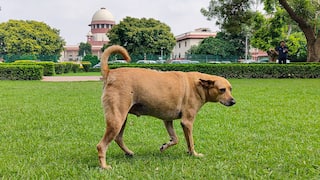COP29: New Collective Quantified Goal Set To Replace $100 Billion Climate Commitment
The draft of the NCQG text, released for debate, has underscored tensions, with countries navigating the complexities of funding sources, distribution mechanisms, and financial targets.

Baku (Azerbaijan): On the third day of COP29, discussions intensified around the draft of the New Collective Quantified Goal (NCQG) on climate finance, set to replace the current USD 100 billion annual commitment expiring in 2025.
G77 and China, the largest bloc representing around 130 countries at the UN climate talks, on Tuesday rejected the framework for a draft negotiating text on a new climate finance goal -- the central issue at this year's climate summit in Baku, Azerbaijan.
The draft of the NCQG text, released for debate, has underscored tensions, with countries navigating the complexities of funding sources, distribution mechanisms, and financial targets.
The High Ambition Coalition (HAC), representing some G7 countries absent from COP29, including Canada, France, and the Netherlands, emphasised the need for developed countries to lead and fulfil their financial obligations.
Brazil, on its part, announced a targeted emission reduction of 59-67% by 2035, with a commitment to adaptation strategies.
Arunabha Ghosh, CEO of the Council on Energy, Environment, and Water (CEEW), pointed out the challenges posed by the draft’s numerous options, calling for a finance goal that aligns with developing nations' needs.
He stated, “The NCQG should be at least USD 1 trillion per year, comprised largely of grants and concessional finance.” Ghosh emphasised that climate finance must be concessional, catalytic, and credible to drive real impact.
Professor Purnamita Dasgupta of the Institute of Economic Growth highlighted the importance of a comprehensive framework that addresses transparency, equity, and dedicated allocations for mitigation, adaptation, and loss and damage. She noted that the NCQG must be a “strategic, urgent, and real-time deliverable,” addressing public finance and arrears alongside future flows to avoid the shortfalls of previous pledges.
Alejandra Lopez, Climate Diplomacy Director at Transforma, explained the dissatisfaction among the G77, which led to a rejection of the initial draft.
She stated, "It was really long, lots of repetitions, lots of duplications, and basically options weren't clear. It wasn’t a workable text to negotiate." Following this rejection, the co-chairs were tasked with drafting a new, streamlined version to be presented the next day.
Echoing this sentiment, Joe Thwaites, Senior Advocate for International Climate Finance at the NRDC, described the iterative process the text has undergone.
"The text started at 65 pages, was reduced to 35, then down to 10 pages. But, as Alejandra said, there are a lot of parties that weren’t happy with that,” he explained, highlighting that negotiations are often complicated by countries wanting their ideas visibly included in the draft, even if it leads to an unwieldy document.
Sandra Guzman, founder of the Climate Finance Group for Latin America and the Caribbean, emphasised the need for countries to feel their perspectives are reflected before they can streamline discussions. She pointed out the challenge, explaining, “Proposals from certain groups were in brackets and others were not, creating discomfort and a sense of imbalance." Stakeholders underscored the need for a robust, well-defined NCQG that ensures equitable financial support for developing countries.
David Ryfisch, head of Future-Proof Finance at German Watch, noted that time is running out, adding that some elements of the draft, like transparency arrangements and access to finance, could serve as potential points of convergence.
However, he acknowledged the high level of political complexity involved, as each step must be carefully sequenced to reach agreements on financing targets.
For Guzman, the goal is not just about setting a numeric target but achieving qualitative elements, such as targeted finance for adaptation and loss and damage. She shared her hope that convergence on these points could begin soon, saying, “It is possible...but the point is how we are going to get there and the willingness actually from the countries." Ryfisch also highlighted developed countries’ focus on the “investment goal” to direct finance towards developing countries, acknowledging that despite the absence of concrete numbers, back-channel calculations are underway to shape their financial commitments.
(This report has been published as part of an auto-generated syndicate wire feed. Apart from the headline, no editing has been done in the copy by ABP Live.)
Related Video
Breaking News: Maharashtra Politics Shifts: Congress Suspensions Boost BJP Ahead of Local Body Polls





































